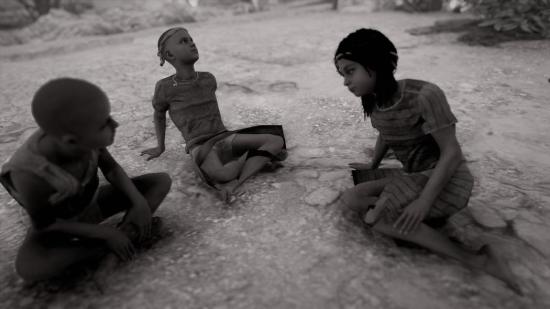Happy New Year! Or maybe not so happy. 2018 has begun, and it has already brought some powerful games criticism that puts playful interactive media in dialogue with decline, decay, and the death of civilisations. Lighting up the darkness are examinations of meditative practices and visions of a life beyond oppressive social norms.

Being seen
Two writers address how game designs put players into different visual modes, and thereby change the whole nature of play.
- We Made Our Own Myths in 2017’s Photo Modes – Waypoint
Dia Lacina theorises player agency and power in the practice of video game photography. - Kinect was amazing – in a museum • Eurogamer.net
Christian Donlan observes that some technologies are better suited to installation art than home consumer electronics – but it’s impossible for corporations to keep a product alive if it doesn’t have a mass audience.
“Video games have historically been rather solitary things, and when you stick them in a museum they just sort of sit there and get a bit sad. Kinect, though, is all about being seen.”
Disorder and healing
(Content warning: mental illness)
These four fascinating pieces of writing look at the impact of games on mental health and how they portray mental illness.
- Immensity to Dream In
Jay Castello gives an overview of games that portray meditation, and games that facilitate it, comparing contemporary myths about mindfulness to new ways of practising it. - Experts Have A New Reason To Debate Whether ‘Gaming Disorder’ Is Real
Cecilia D’Anastasio interviews psychiatrists to make sense of why gaming disorder is a problematic way of thinking about problem gaming. - Using Psychology and Loot Boxes too Destroy Video Games: A Fun and Practical Guide | The Psychology of Video Games
Satan himself, borrowing the pen of Jamie Madigan, summarises the psychological tropes that loot boxes are designed to exploit. - Hellblade and Living with Psychosis | Sidcourse – YouTube (video: auto captions)
Leonardo Da Sidci highlights the way the protagonist’s delusions are portrayed as not only frightening, but also such an intrinsic part of her and the player’s experience – sometimes even a helpful part of it – that they cannot be easily eradicated.
Queerness
Queer theory has a strong impact on two pieces published recently, that both address how media and storytelling affect the norms that guide our society and determine who fits in and who is left out.
- Becoming Beautiful: A Year of Living with ‘NieR: Automata’
Jon Sorce reads this game’s portrayal of robots reconstructing human society, through an understanding of gendered modes of expression as not innate, but constructed. - Atlus, We Haven’t Forgotten Your Mishandling of LGBTQ Characters – Waypoint
(Content warning: transphobia, transmisogyny, intimate partner violence, murder) Carol Grant gives a thorough summary of Atlus’s transphobic storylines, explains the assumptions on which they operate, and demonstrates why it matters.
““Gender essentialism” is the theory that our gender differences are innate, universal, and—according to transphobes—biological. Atlus’ games are rife in [sic] essentialism.”
Pervasive numbness
Unsurprisingly, there is a growing sense of decay and collapse after reaching the end of 2017; these writers reflect on how that has come out in game design.
- Animal Crossing: Pocket Camp is a perfect metaphor for late capitalism | ZAM – The Largest Collection of Online Gaming Information
Kate Cox argues that by playing as the “mayor of nothing” we finally confront the empty reality of millennial capitalism, and calls for games that can help us to imagine an alternative. - The Vaporwave Aesthetic of Broken Reality | Unwinnable
Khee Hoon Chan addresses the millennial loss of purpose via nostalgic superflat glitch aesthetics in this mid-development title.
“This system of gathering as much social media currency as possible, only for a vague sense of reward, reminds me of the pervasiveness numbness that comes with consumerism.”
Normal apocalyptic
Three critics highlight games that challenge received genre conventions relating to zombies and the apocalypse.
- An Exercise in Being Prey | Unwinnable
David Shimomura encapsulates an elegant design that breathes new life into tired zombie tropes. - The year in apocalypse • Eurogamer.net
Edwin Evans-Thirlwell compares dystopian futures in AAA and fringe indie alike. - A Horror Game That Rejects The Usual Zombie Tropes – Waypoint
Cameron Kunzelman highlights a queer approach to the apocalypse portrayed in These Four Walls Called Reality.
“Normal apocalyptic stories come from a place that assumes now is worse than then, but these four walls called reality puts pressure on the idea that the social world was hunky-dory before. These characters work through their real traumas, each enumerating the ways that they were excluded from living full lives before the dead started rising.”
Plugs
- This Year In Videogame Blogging: 2017 – Critical Distance
Eric Swain completed the mammoth task of rounding up 2017’s games discourse last week – be sure to check it out! - January 2018: ‘Novelty’ – Critical Distance
Taylor Hidalgo has announced the theme of the next Blogs of the Round Table – write something based on this prompt and submit it through Twitter or email to be included in the next monthly BoRT roundup.
Subscribe
Critical Distance is community-supported. Our readers support us from as little as one dollar a month. Would you consider joining them?
Contribute
Have you read, seen, heard or otherwise experienced something new that made you think about games differently? Send it in!


